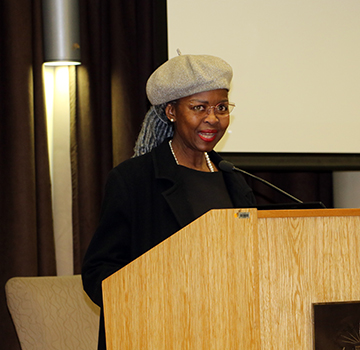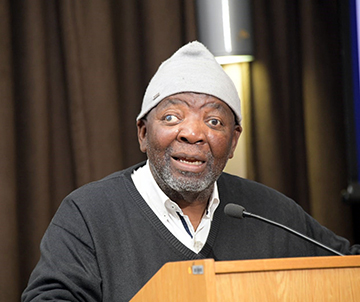News & Events
Men encouraged to open up and seek help on mental and psychological issues

Vicky Malefo
The Unisa Human Resource Department, through the Employee Relations and Wellness Directorate, recently hosted the 2023 International Men’s Health Week commemoration event, themed Thriving as men with significant others, a conversation with Jerry Mofokeng at Kgorong Function Hall, Pretoria Muckleneuk campus.
Vicky Malefo, Health and Wellness Manager, HIV and AIDS Division, in her opening address, welcomed the guests comprised of students and staff members and various health organisation bodies who honoured the invitation to the event.
Malefo pointed out that as part of the Wellness Directorate, they take care of both the physical and the psychological matters of staff and students, and to some degree, their family members, while also detailing the various primary healthcare services provided by the university’s clinics. “We also provide blood tests, dietary, counselling, HIV/AIDS, and other related services,” she added. The event offered a health screening desk that provided free blood glucose, blood pressure services and advice from the Medical Male Circumcision (MMC).
Regular check-ups and exercise
Malefo also stressed the importance of regularly testing for HIV and other illnesses that require ongoing treatment, such as chronic diseases, which, she said, can be managed through the intervention of professionals as long as one commits to regular check-ups.
In recognition of the university’s 150th anniversary and in honour of National Youth Day which is on the June 16th, Unisans will participate in the Road to Democracy March from Muckleneuk to Freedom Park on the 17th of June; this, Malefo said, is an excellent opportunity for men to get some exercise.

Dr Jerry Mofokeng wa Makhetha
Well-known actor Dr Jerry Mofokeng Wa Makhetha, who has an astounding filmography on screen and stage, was the guest speaker for the day. His address began by describing how he got to know his biological father after turning 58. The I Am a Man author said for 58 years, he did not know he was Wa Makhetha. He explained, “I was born Mofokeng, and many of us do not know we have the same issues. The problem is that the very same thing we hate is what we become. For example, you hate that you were a hidden child, and you turn out to be the one that has a child hidden,” he remarked.
Sharing pearls of wisdom, Wa Makhetha said there is a big difference between intelligence and wisdom. One can have a PhD, but living it is a different story. He asked: “If we take away that gown and that certificate, who are you, and what are you?”
Wa Makhetha asked the men in the room whether they would confront wrongdoers at work purely from their work ethics and not from the weight of institutional policies and union rules. He said wrongdoers need help, “Statistics tell us that there are more women than men in the world but that men have a high mortality rate as a result of suicide which results from a sense of failure.”
He told the attentive men that they should be wary of anyone who tells them they’re not men enough, adding that this can mount towards depression. He said fear and failure are the blowers of fuses in men’s lives, and men must be wary of friends, family members or colleagues that cause them to feel worthless.
Seeking help is not a sign of weakness
“I always congratulate men who come for counselling before their wives. One strength about manhood is to allow yourself to be vulnerable,” said Wa Makhetha, adding that in most instances, a man would rather buy an expensive car to boost his ego than seek help.
Addressing health issues, Wa Makhetha acknowledged that HIV remains a stigma not to be negated. He said he grew up at a time when Tuberculosis (TB) had a huge stigma. He explained that people with TB were propelled to live in backrooms and confined there because it was known to be contagious. He argued, however, that people were more scared of the stigma than the actual disease. Wa Makheta also disclosed that he was diagnosed with cancer but added that he is not deterred from fighting and dispelling myths about the illness.
Instant gratification−a mental prison
Describing men who do not want to take responsibility, Wa Mathekha said that there are boys who want instant gratification without the responsibility that goes with it, adding that they want the freedom of boys but the benefits of men.
He encouraged men to stop running away from their responsibilities and seek professional help instead of running towards substance abuse. “The problem is not what is in the bottle, but what is inside us,” he said. “ I have been told by a therapist in this area of addiction that if you can find out what void you are trying to fill in, if you can name it, and decide to deal with it, you will find positive ways to detach from that bond. But you need to find courage and acknowledge that you have a problem,” he remarked.
Forgiving the past and living in the present
Wa Makhetha acknowledged that many men have wounds from their past due to traumas from their upbringing, which range from neglect, abuse, and rape.
He advised that men should start by forgiving themselves first, followed by everyone who harmed them. “Accept that an apology may never come but move on.” He encouraged Unisa men, staff and students to seek help through the university’s Employee Relations and Wellness Directorate.
#Unisa150
*By Godfrey Madibane, Acting Journalist, Department of Institutional Advancement
Publish date: 2023/06/15
